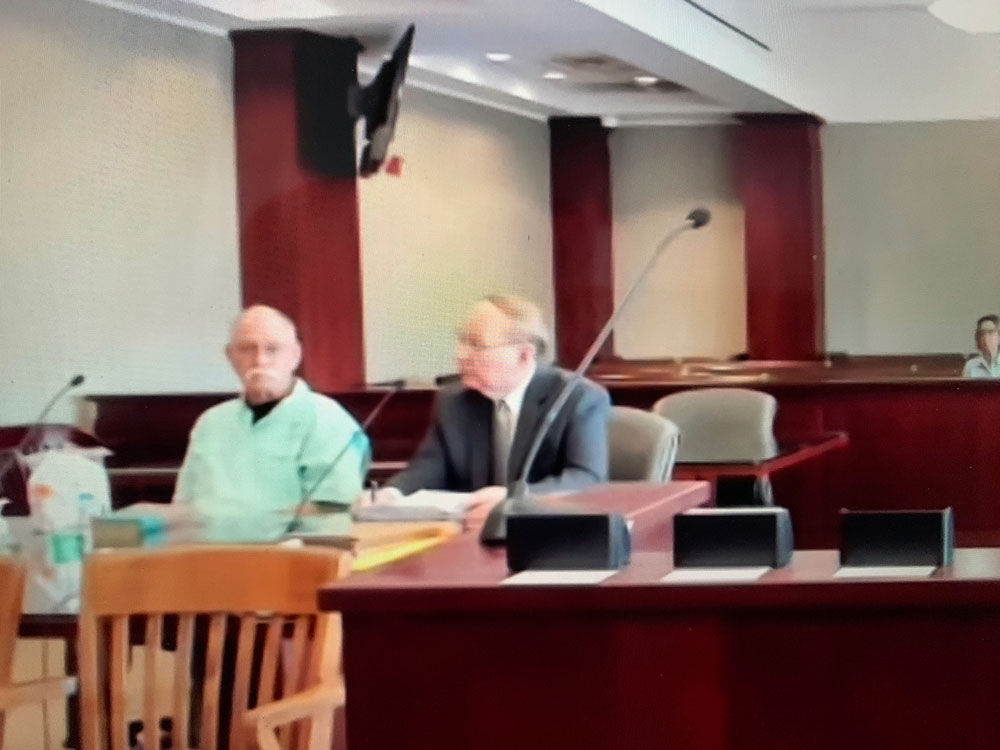
John Ridgley Gardner Jr., a 72-year-old resident of Zonal Geranium Court in Palm Coast, was sentenced this morning to five years in prison followed by 10 years in probation on 13 second-degree felony counts of possession of sexual abuse video and images of minors.
Gardner, who’d lived at his Seminole Woods home for almost two decades with his wife after moving to Palm Coast from Marathon in 2005, had faced a minimum of 14 years and a maximum of 195 years in prison, based on the state’s sentencing guidelines.
“This is a downward departure in that regard,” Circuit Judge Terence Perkins said, addressing Assistant State Attorney Melissa Clark, and using the legal terminology of imposing a more lenient sentence than the guidelines call for. There was no mandatory minimum in the case. Clark prosecuted the case. Perkins said he was assuming “that the state was considering in its negotiations Mr. Gardner’s age, background, all of that.” In other words it was an agreed-upon plea between the State Attorney’s Office and Gardner, who’d pleaded to the charge before Perkins on March 9.
“I do accept for good and valid reasons that this is a downward departure. Somewhat downward departure,” Perkins said. “And, again, that was all made known to me at the time that I accepted the plea in that regard.”
Gardner was arrested last August 20 at his home, following an investigation by Flagler County Sheriff’s detective Dennis Lashbrook, who leads the agency’s cyber crimes unit. Lashbrook had been alerted to Gardner’s activity by cybertips, a system by which service providers that detect certain illicit and explicit materials on their servers inform authorities. Gardner had been using a MicrosoftOne Drive account until the company shut it down because of its content. Lashbrook subpoenaed the contents, along with evidence from Charter Communications, Gardner’s internet service provider. The evidence pointed to Gardner. He did not deny it.
“I am the one who is responsible for this, it’s no question,” he told authorities when he was served a search warrant. He told detectives he had not abused children as an adult, but that he had done so as a teen, when he abused his younger sisters. As a recovering alcoholic for the past 30 years, he said he had substituted one addiction for another. He said he had “gygabytes”‘ worth of material, collected over years from usenet-type sources and stored on dozens of thumb drives, hard drives, CDs, and computers–laptops, tablets, desktops. He could, in effect, have been charged for every single one of the items, resulting in a potential sentence measured in millennia, not mere years.
Clark asked the court to ensure in its order that he would forfeit all those electronics. Some of the devices included family photos that Gardner wanted to recover. “But anything that contains contraband of course pursuant to the plea agreement would be forfeited,” his attorney, Gilbert Schaffnit, said.
Neither the defense nor the prosecution had witnesses wanting to address the court. Only Schaffnit acknowledged the court’s forbearance, delaying sentencing to Gardner could by his wife’s side during health issues.
“Both Ridge and [his wife] would like to thank the court,” Schaffnit said, using Gardner’s nickname, “and Ms. Clark for accommodating the rescheduled sentencing hearing to allow for additional medical testing of Mr. Gardner’s wife. It’s greatly appreciated.”
The judge imposed the sentence. Gardner was fingerprinted, as is standard for all felons entering the Department of Corrections system, and he was taken into custody, first to be re-processed at the Flagler County jail, then to a state prison “reception” center, as the department to this day grimly calls inmates’ first point of contact with the state’s prison archipelago.
Upon release–assuming he is alive then: he is to serve his sentence day for day, sex offenders being ineligible for early release–Gardner will have to follow 15 special conditions, including an annual polygraph. He will be branded a sexual offender for life.





























Leave a Reply